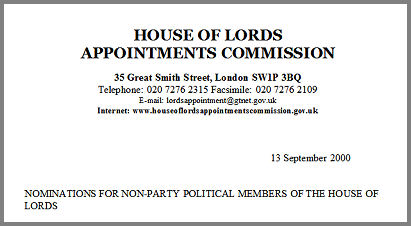Donald MacLean's Blog 13
ALMOST
"Dear Sir Donald,
It is with the greatest pleasure that my colleagues and I convey to you ......"
This is a letter of congratulation from an old Knight of the British Empire to (as he believed) a new one - delivered to me on January 1st several decades ago by a courier hurriedly-summoned by the legal practice which had provided a first home for an organisation of which I was founder/chairman.
The writer is a senior civil-servant with whom I had worked during the long and difficult process of updating the UK's Copyright Laws.
Wow. "Sir Donald". Sounds rather nice.
I scurried to my newspaper to read the "Honours List" which is published every New Year's Day. Never many "K"s. There they are. One of them is a man that I know (must write him) ... ("It is with the greatest pleasure .... "?)
But there is no "Maclean, Donald H., for services to the information industries".
Nope. Plain Mr MacLean remains unable to respond to snooty mâitre-d's with a quiet "Actually it's Sir Donald".
What on earth had prompted this letter from a 'usually well-informed source'? Poor man ... how embarrassed he must be. A hasty note: "Dear Sir John, Do not be concerned ... I have put your letter into our new shredder ... please think no more of it ... am most grateful for your kind words ..."
.jpg) |
I didn't say I'd shred his envelope:
(I've just disinterred it from the depths of my 'archive' drawer to show you. If you recognise the handwriting please be so kind as to keep his secret!)
It was good that my shy wife was not burdened with this during her last, ill, days. She would have been pleased for me but would have been uncomfortable to be Lady Margaret.
So why the letter? In the arcane world of honours you must display blushing surprise and delight when you receive one ... and asking "Why didn't I get one?" is well beyond the pale!
I did try the phrase "Why might a senior civil-servant think I'd been honoured?" and got a convoluted answer about a sponsoring M.P. who had secured the Prime Minister's written approval but who had, at the very last minute, failed to vote on something in the manner required by his party and had been excommunicated. (Or whatever it is that happens to Members who express inconvenient opinions of their own.)
Almost.
Reviewing my first year's blogs I wonder if I have focused on successes and neglected the near-misses and downright failures which I also achieved! So - as I'm now much too old to be burnishing my CV - I thought you might find interesting a few of my "almosts". Including a rather spectacular non-achievement with which I ended my 29 years at the BBC!
Now that the negatives are popping back into my mind, I should report a particular 'almost' that would have trumped even a knighthood:
|
|
I received a missive on this impressive letterhead. It announced that I had been nominated for one of the new non-party-political peerages ("Peoples' Peerages") and required me to furnish references and a list of my 'achievements'. Its tone was unequivocal - an 'HR' department addressing a job-applicant.
I had several friends in the upper house and was aware that they (well, most of them) did treat it as a job, a purposeful job - holding the Executive to account and providing some counter-balance to the political parties in matters of which they had experience.
But ... Well ...
"Dear Sirs, Yes, I'd like to be a Baron, please. I launched Shirley Abicair and Russ Conway and Matt Monro on their stellar TV careers ." Mmmm ... their lordships may never have heard of them.
"I harried the House of Commons and the Civil Service until they included Video in the Copyright Act, and again, for two years while we adjusted the law to include computer software." Maybe ... if translated into Whitehall-speak?
"I chaired the Cabinet Office's most difficult forum and, once it was well-established, persuaded my boss, the retiring Chairman of ThornEMI plc to take my place for several productive years". That's more like it.
The administration of that top-level forum was
carried-out by a very well-connected Barrister with long experience of
politics as well as broadcasting and journalism. He kindly agreed to
manage this job-application for me.
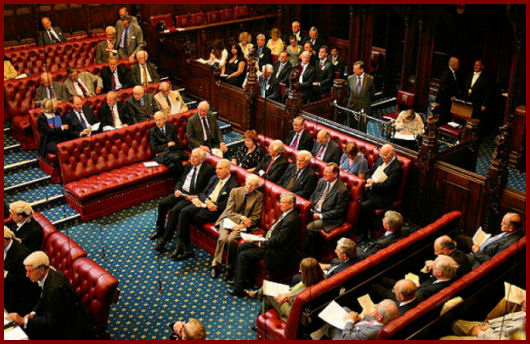 |
From his hand my 'achievements' certainly impressed
me! An ennobled ex-Cabinet Minister and the Governor General of
New Zealand, for example, were among many who asserted
that I'd be most effective in the job.
You may remember the outcome - a group of
exceptional men and women were appointed - precisely those who would have been chosen under the traditional system.
The Commission was
disbanded. The "Peoples' Peerages" idea was allowed to wither and die.
Honours are too valuable a tool - for all politicians - to fall into the hands
of 'the People'.
(My friend the nice Barrister was awarded a well-merited CBE - the honour next to a Knighthood. So I was able to write another letter starting "It is with the greatest pleasure ... ".)
Almost.
Hertfordshire is a large county near London. During many of the events covered in my first year of blogs I lived in a market-town at the Eastern end of the county. After Margaret died I moved to the Western end - where Ann and I live now. In fact the Western extremity of our village was in the next county - Buckinghamshire.
Several services seemed to be better in Bucks than in Herts (the local hospital was newer, local taxes were lower). So when we bought a home here we moved into the Bucks sector. After several decades in Herts I'll admit I also got an emotional buzz from being in new territory.
As a retiree I suppose I was uneasy about being entirely unemployed and so I joined the teams of some local charities. And resisted my usual inclination to reorganise them! Except ... when Bucks County asked me to chair their Voluntary Services Committee, which had become dysfunctional, it was a familiar kind of challenge and I agreed.
While we were settling into our new home a busy administrator tired of having to check whether every local matter was in his part of the community or not - he proposed that the boundary be moved - just a little Westward - so that the whole village was in Herts. Naturally his opposite number in the other county supported the idea and, in accordance with some directive, a Public Enquiry was initiated to discover the views of we citizens.
The Boundaries Commission organised several local meetings chaired by their Inspector. They were very well-attended - no apathy in this, the UK's most-loved domicile. And public opinion was clear-cut - everyone in Herts voted for the status quo - as did those of us in Bucks. For once the democratic process produced a clear-cut result. No change. Thank goodness!
Meanwhile the Voluntary Services Committee met and I was introduced. It was responsible for coordinating 28 different public services provided by volunteers - and the Committee comprised the leader of each one. 28 Chairmen! Or rather Chairpersons - nine of them were men, 19 were women. (The sort of formidable rural ladies who get things done.) The whole Committee met monthly and all its members had equal voting rights, of course. No wonder they were finding decision-making a little difficult!
I proposed that they elect a 7-person Executive from among their number ... and that they re-constitute themselves into a top-level policy forum which would meet only twice a year ... to discuss objectives and strategy ... with the Executive responsible for implementing them.
The 7 volunteers rather quickly emerged, as did a very capable Leader who was elected by a majority. We set the date of the first bi-annual policy forum - then spent the rest of the meeting listing their objectives.
I went to their first 'forum' - and was quickly able to sit at the
back while the Executive Chairlady managed, very competently, an energetic
discussion.
Many months later it struck me that we'd heard nothing from the
Boundaries Commission so I phoned them. A clerk called me back. The
Inspector's report had been brief -
the extensive consultations had revealed a wish to maintain the
status quo that was unanimous ... nevertheless the boundary was to be moved "for administrative
convenience"!
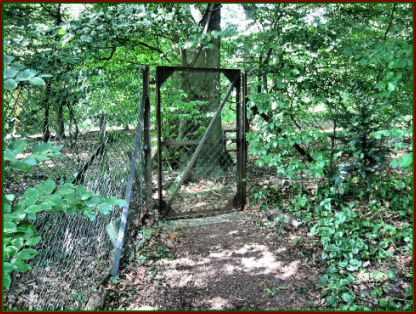 |
Regulations had required them to conduct the
consultations ... but, apparently, did not require them to pay the slightest attention to what they
revealed.
The convenience of the administrators was more important than the unanimous wishes of those who paid their salaries.
Few of us complained. Breath-taking
arrogance strikes us dumb.
(With events like that, and the Iraq war, it's hard not to feel some anxiety for the health of democracy in Britain.)
So, after a brief spell in the county I'd chosen, I write to you now from my umpteenth decade as a resident of Hertfordshire, UK.
Twice a day we go through a gate at the end of our garden and walk the dog in the 56 acres of communal woodlands.
Which are entirely in Buckinghamshire.
Almost.
I always felt that my popular-music domain was a 'below-stairs' part of the BBC - in the servants' quarters of a class-conscious corporation. We weren't even a 'department' but a junior section of Variety Department (where the great comedy series were produced). So that, in the sixties, when the pirate radio ships (with no 'needle-time' constraints) were closed-down, I was optimistic that my BBC parish, as their replacement, might at last achieve the status it deserved.
The signs were good - I was invited (as were others) to suggest how the 'Home' and 'Light' networks might be reshaped - a challenge I relished.
The BBC had a long-established mantra that a tax-funded broadcasting monopoly was justified "because the radio spectrum is a scarce resource". I repeatedly tried and failed to persuade my bosses that this would become untenable - because ever-higher frequencies would become usable (they have) and new technologies would permit very much more intensive use of the existing spectrum (they have).
I submitted detailed proposals to replace Light Programme with 2 networks covering the gamut of popular music and labelled them "1" and "2" (emphasising that they should be given properly descriptive names) and described in detail a 'minimum-talk/easy-listening' Nr 2 as the centrepiece.
At one meeting I was quizzed '... hypothetically, old chap ...' about who should help me run the new system. I included my friend Robin Scott who had been a fellow producer of "Come Dancing" and was now on attachment to a European TV Service - not because he'd written a hit record ("Softly Softly" by Ruby Murray) but because he understood the audiences for various kinds of music and, of course, some of the practicalities of catering for them.
My ideas seemed to be approved and when I suggested that I go to the U.S. for 10 days to discover how the new 'automated' music stations worked that was immediately agreed.
In America the new technology fascinated me as an engineer but had limited relevance to any potential network-controller with very restricted use of records.
It happened that my mother was in Florida with a cousin whom she frequently visited and we agreed to rendezvous in New York on our way home.
The head of the BBC's New York office was another longtime friend (his son later created the delightful Wallace & Gromit characters) and I was happy when he said "promise me you'll pop in on your way home - we're having a small celebration'.
At the premises in the Rockefeller Center there were two surprises - in Peter's office sat my smiling mother, whom I'd expected to meet the following day ... and the party was a celebration of the imminent announcement of the new network controller in London - me! Peter had no evidence that I'd been appointed but considered it fait-accompli ... he had invited some of my New York friends to the party.
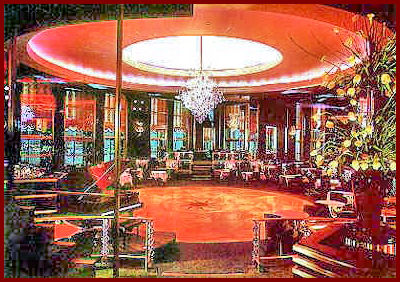 |
A very happy evening ended with dinner upstairs on the 65th floor - the
famous 'Rainbow Room' - at a table which gradually expanded as more of my
friends from the world of broadcasting joined us. On the bandstand was a
group led by legendary trumpeter Jimmy McPartland,
founder of the Chicago style of jazz. (Jimmy's English wife Marian, the
wonderful jazz pianist long resident at New York's 'Hickory House' nightclub, had
twice appeared on my 'Jazz Club' broadcasts while
visiting her mother in Hampshire.) At the band's break Jimmy and I were
introduced by Alastair Cooke - who, to the delight of my mother, devoted the
evening to flirting outrageously with her.
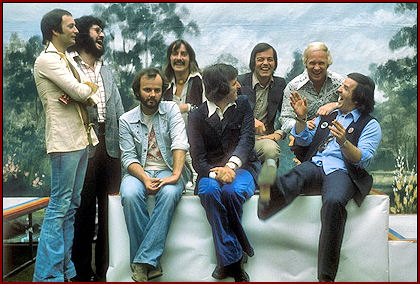 |
|
Radio 1's first D-J's |
(I'm sad to hear - in Dec 09 - that the Rainbow Room is no longer economic and may close.)
On the flight to London I warned my mother that kind Peter had jumped the gun - I was not counting any chickens.
Which was as well. The BBC launched three networks with the (non-descriptive) names Radios 1,2 and 3.
And announced the new Controller - Robin Scott.
Almost.
One of the nicest results of these blogs, for me, is restoring contact with friends with whom I'd lost touch. Like Peter G. He was my legal adviser at EMI and subsequently moved to America. I am happy to have an email saying he is enjoying my reminiscing. Peter recalls an office junior called Simon Cowell in one of the EMI music companies - whose name is currently in all the newspapers (even my sober Financial Times) reporting the millions a month he is earning, on both sides of the Atlantic, from the several TV series in which he appears and which are created by his production company Syco.
This reminds me of a forecast I made in the eighties - that one day it would become technically possible for viewers (ie the whole population) to watch a programme about a politically hot topic and, at the end of it, to register instantly their vote - a process which would be popular - and which would rapidly start to feel like part of the democratic process ... with potentially serious tension with parliament! That technology is now in action with "Strictly Come Dancing" and "X Factor".
[I had concluded this blog with what I hoped would seem a dramatic forecast that Simon Cowell could be the person who would one day launch this sort of public-relations missile. When I mentioned this during my family's after-Christmas-lunch debate I was told by several round the table that he has just announced precisely that!]
Which leads conveniently to the events concerning Audience Measurement which I promised to report to you in an earlier blog. This was my final tilt at the sturdy windmill of British Broadcasting:
Founding the BBC John Reith gave it the purpose "To Inform, Educate and Entertain." In my day that was the order of priority - and I regularly suggested that it was wrong. Entertainment, I suggested, must come first ... fail to entertain your audience and you neither inform nor educate them. (My old eyes and ears tell me that my successors must have been more persuasive - they often overshoot that target now!)
The BBC's excellent Audience Research department had been developing since 1936 under Robert Silvey. In addition to audience size it also told us producers the audience's reaction to our efforts. Quality as well as quantity was measured - a unique service in the world of communication and one that I wanted to exploit.
It seems to me obvious that audience statistics should be one of the foundation-stones of a department with "Popular" as its name. Therefore it irked me that we, who created every week many times the output of the entire record business, were using as a criterion of success the weekly sale of records - the Hit Parade.
It was appropriate for programmes serving those who value 'newness' - but misleading for the broad 'middle-of-the-road' audience, many of whom depended for their music on their radio not their record-player.
The more popular a record the more quickly it sells. The more quickly it sells the sooner the market is satisfied and its position in the sales charts declines. It may be the most popular piece of music in the land but in the record industry the marketing emphasis has rightly moved on. If a would-be "popular" broadcaster also moves on he is serving the record industry but short-changing his audience - his programme is not as popular as it should be. The needs of record producers and radio producers are not identical.
It's not just a phase-difference. The Hit Parade tells the broadcaster nothing about the 'life' of different popular pieces. It serves the record industry well - and the 'popular-music' broadcaster and his listeners badly.
 |
It seemed to me that Mr Silvey's operation held the answer. Not only could they tell us what listeners want to hear this week - much more relevant than what they bought last week - but it would swing the spotlight round to where the creative focus actually was. The BBC would be where the public turned to discover what was popular. The new networks I yearned to design would then be seen to be the creators of pop-music stardom, and would thus serve the licence-payer better. A genuinely-'popular' music service.
Only in the UK - in the BBC (with Robert Silvey & co) - would this be practicable. And with my friend Brian Epstein making Britain the centre of the pop universe, at least for a while, there would never be a better time to achieve this.
I tried everything I knew to persuade the BBC hierarchy. And failed.
For some of them an increase in the importance of pop music was simply undesirable - informing and educating were what mattered.
The others understood that the BBC must replace the Pop Pirates ... and everyone told them that Pop = Hit Parade.
Everyone but me ... a lone voice predicting that we would inevitably lack 'pirate-credibility' - Auntie with an eye-patch ... unless we mobilised the transforming power of Mr Silvey ... with the potential for a seismic shift - favourable to us and our listeners - in the nature of entertainment.
Almost.
They were short-sighted but I don't blame them for this. Nor for the Controller appointment. Because of my job I had (studiously) published no songs, and Robin was an intelligent, charming man who'd had a record in the Hit Parade ... and who had no strange bees in his bonnet about upstaging the record industry.
But I find it difficult to describe to you the enormity of their misjudgement about the Hit Parade. Had they been just a little better-informed, understood just a little more of the 'mechanics' of popularity, how different the world of mass entertainment might now be.
I did my damnedest. It wasn't enough.
I registered as a mature student in Business School and returned a phone call from the founder of a major talent agency who had retired and was now acting as personal agent for some senior managers in the information industries.
Had these last 'almosts' come about I'd probably have missed the quite different challenges and rewards of my second career - in business.
I don't do regret. But occasionally it's fun to recall a few things that just, almost, might have been?
Especially on January 1st.
D.H.M.
"Success is the ability to go from one failure
to another with no loss of enthusiasm"
Sir Winston Churchill
- - - - - -
Back to 'Contents' table
On to Blog 14
- - - - - -
